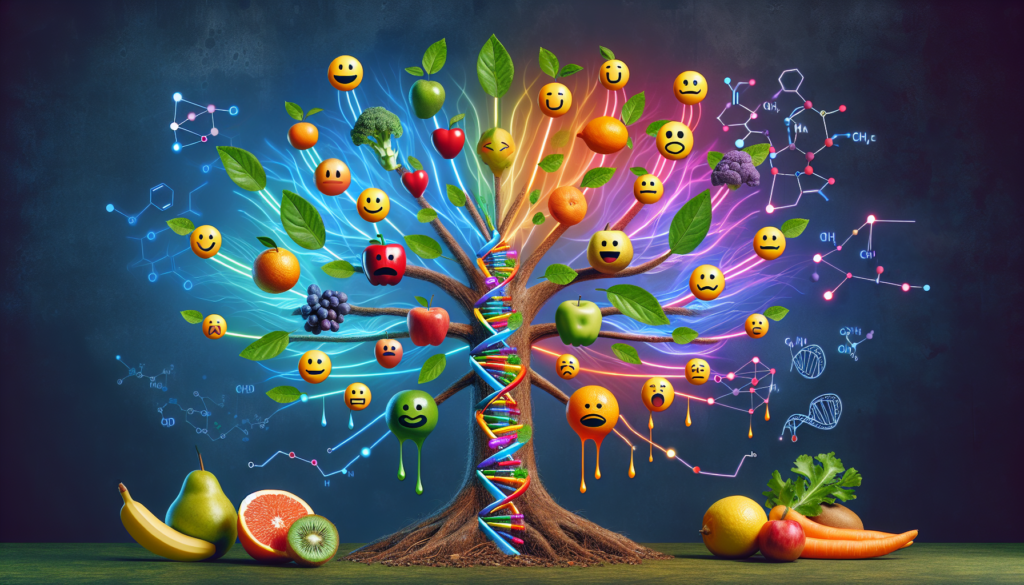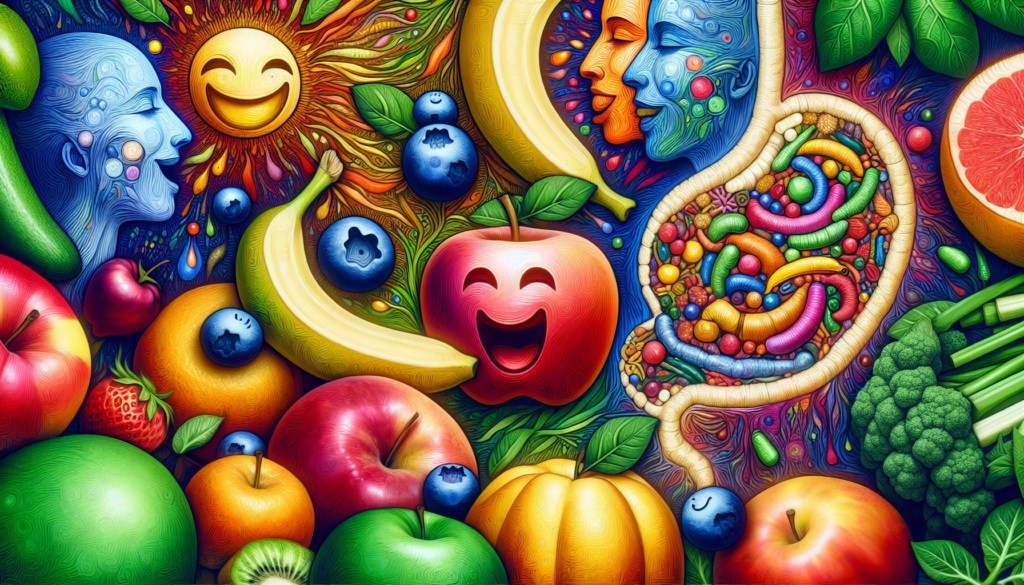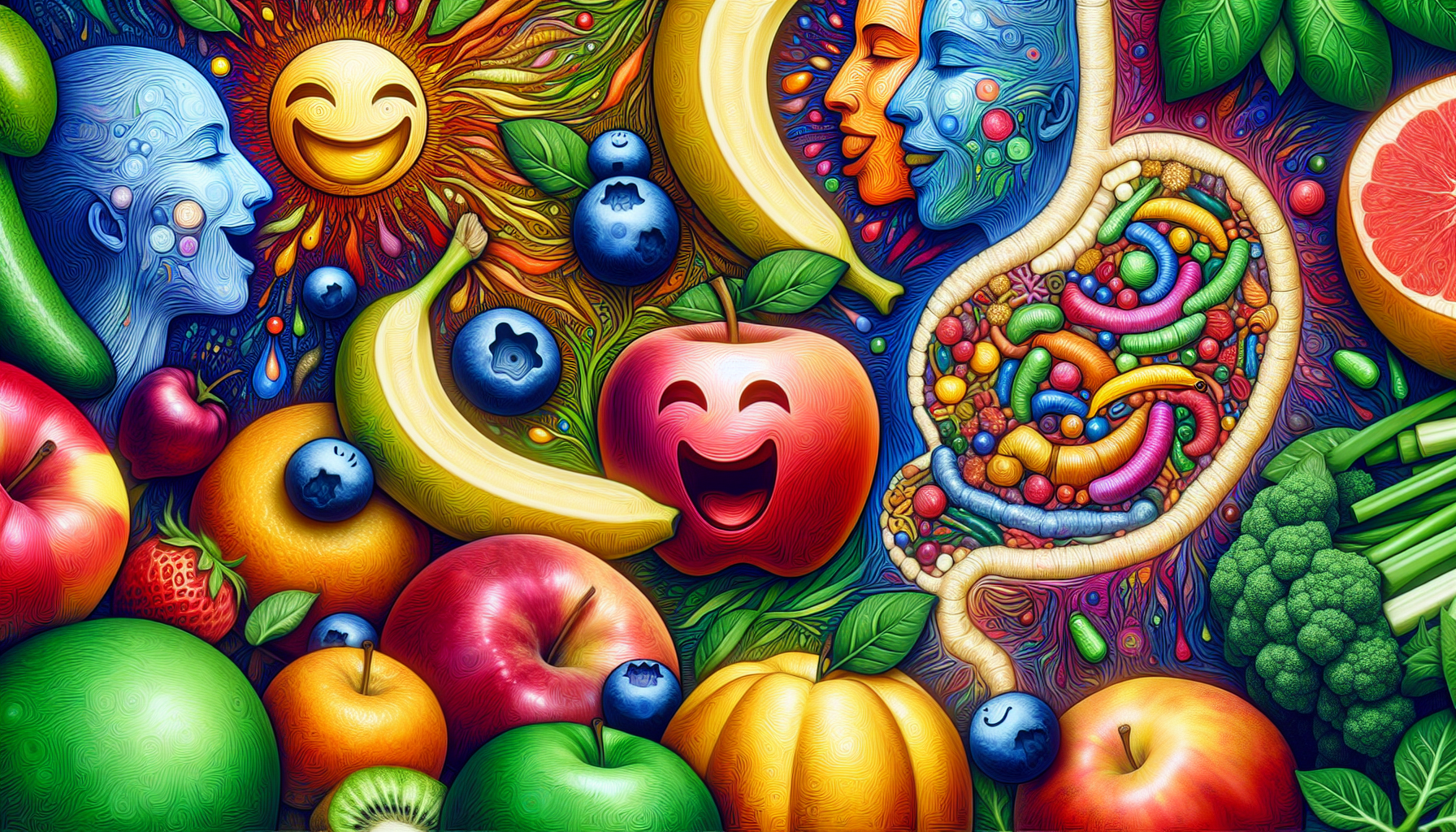Are you aware of the profound impact that your diet can have on your emotions? It turns out that what you eat can significantly influence your mood, energy levels, and overall mental well-being. A growing body of research has revealed a fascinating link between the foods we consume and our emotional state. From the effect of certain nutrients on neurotransmitters in the brain to the role of gut health in regulating mood, understanding the relationship between diet and emotions can empower you to make informed choices about what you put on your plate. So, let’s explore the fascinating connection between your diet and your emotional well-being.
Effects of Diet on Emotions
A person’s diet has a significant impact on their overall well-being, including their emotional state. The nutrients we consume, the health of our gut, and even our blood sugar levels can all play a role in influencing our emotions. Understanding these effects can help us make more informed choices about the foods we eat and ultimately improve our emotional well-being.
Impact of Nutrient Deficiencies
Nutrient deficiencies can have a profound effect on our emotional health. For example, a lack of certain vitamins and minerals, such as vitamin D, B vitamins, and iron, can lead to feelings of fatigue, irritability, and even depression. These nutrients play vital roles in the production of neurotransmitters, such as serotonin and dopamine, which are directly linked to our mood and emotions. Therefore, ensuring that we have a well-balanced diet that includes a variety of fruits, vegetables, whole grains, and lean proteins is essential for maintaining optimal emotional health.
Role of Gut Health
The health of our gut also plays a crucial role in our emotional well-being. The gut-brain axis, a complex communication network between our gut and brain, allows for bidirectional communication that can influence our mood and emotions. The trillions of bacteria residing in our gut, collectively known as the gut microbiota, have been found to produce neurotransmitters and metabolites that directly impact our brain function and emotional state. Consuming a diet rich in fiber, probiotics, and fermented foods can help support a healthy gut microbiota and promote better emotional well-being.
Influence of Blood Sugar Levels
Maintaining stable blood sugar levels is another essential factor in regulating our emotions. When our blood sugar levels spike and then crash due to consuming high-sugar foods or refined carbohydrates, it can lead to feelings of irritability, fatigue, and mood swings. On the other hand, consuming a diet that is balanced with complex carbohydrates, healthy fats, and lean proteins can help to stabilize blood sugar levels and provide a steady energy supply throughout the day. This balanced approach to nutrition can help promote emotional stability and prevent drastic mood fluctuations.
Specific Diets and Emotional Well-being
Certain dietary patterns have been linked to improved emotional well-being. Let’s explore three of these specific diets and their potential effects on our emotions.
Mediterranean Diet
The Mediterranean diet is known for its emphasis on whole, minimally processed foods such as fruits, vegetables, whole grains, legumes, fish, and healthy fats like olive oil. This diet has been associated with reduced rates of depression and anxiety. It is believed that the high intake of fruits and vegetables, which are rich in antioxidants and nutrients, along with the consumption of omega-3 fatty acids from fish, contribute to the mood-enhancing effects of the Mediterranean diet.
Plant-based Diets
Plant-based diets, which focus on consuming mostly plant-derived foods while minimizing or excluding animal products, have been shown to improve emotional well-being. The abundance of fiber, vitamins, minerals, and phytochemicals found in plant-based diets nourish both the body and mind. Additionally, research suggests that individuals following plant-based diets may have lower levels of symptoms related to depression and anxiety.
Low-carb Diets
Low-carb diets, such as the ketogenic diet, have gained popularity in recent years. While these diets can lead to weight loss and improved metabolic health, their impact on emotions is less clear. Some individuals may experience short-term mood changes during the initial adaptation phase due to fluctuations in blood sugar levels. However, long-term effects on emotional well-being may vary between individuals. It is important to approach low-carb diets with caution and monitor their effects on mood and emotions closely.

Food and Mood
Specific foods have been identified as having the potential to enhance our mood and emotional well-being. Let’s explore some of these foods and the mechanisms behind their mood-boosting effects.
Serotonin-Boosting Foods
Serotonin is a neurotransmitter often referred to as the “feel-good” hormone because of its role in regulating mood, happiness, and well-being. Certain foods can help boost serotonin levels naturally. These include foods rich in tryptophan, such as turkey, chicken, oats, and nuts, as well as those rich in complex carbohydrates like whole grains and legumes. Tryptophan is the precursor to serotonin production, while complex carbohydrates aid in its absorption.
Tryptophan-Rich Foods
Tryptophan is an essential amino acid that our bodies cannot produce and must be obtained through our diet. It plays a critical role in the production of serotonin, as mentioned earlier. Consuming foods rich in tryptophan, such as salmon, eggs, spinach, and tofu, can help increase serotonin levels and improve mood. Combining these foods with sources of vitamin B6, found in bananas and chickpeas, can enhance the conversion of tryptophan into serotonin.
Omega-3 Fatty Acids and Mood
Omega-3 fatty acids, particularly EPA and DHA, have been widely studied for their potential effects on mental health and emotional well-being. These essential fatty acids are primarily found in fatty fish, such as salmon and sardines, as well as in walnuts, flaxseeds, and chia seeds. Research suggests that omega-3 fatty acids may help reduce symptoms of depression and anxiety by supporting brain function and reducing inflammation. Including these foods in our diet can potentially have a positive impact on our mood and emotional state.
Emotional Eating and Food Cravings
Emotional eating refers to the act of consuming food as a way to cope with or regulate emotions, rather than in response to physical hunger. Understanding emotional eating and its triggers is essential for nurturing healthy coping mechanisms and cultivating a positive relationship with food.
Understanding Emotional Eating
Emotional eating is a common response to stress, boredom, sadness, or other negative emotions. It often involves consuming high-calorie, comfort foods that provide temporary relief or a sense of pleasure. However, emotional eating can create a cycle of guilt, shame, and further negative emotions, leading to a worsening of the emotional state. Recognizing emotional eating patterns and finding alternative ways to address emotions can help break the cycle and promote healthier coping strategies.
Triggers for Emotional Eating
Identifying the triggers for emotional eating is a crucial step in managing this behavior. Emotional eating can be triggered by various factors, including stress, social situations, emotions such as loneliness or sadness, or even certain types of environments or activities. By becoming more aware of these triggers, individuals can develop strategies to address and manage their emotions without relying on food.
Nurturing Healthy Coping Mechanisms
Nurturing healthy coping mechanisms is vital for breaking the cycle of emotional eating. Engaging in physical activity, practicing mindfulness or meditation, seeking social support, journaling, or engaging in hobbies or creative outlets are just a few examples of alternative ways to cope with emotions. Finding activities that provide a sense of fulfillment, joy, and relaxation can help individuals develop healthier habits and reduce reliance on food as an emotional crutch.

The Role of Food Additives
Food additives, such as artificial sweeteners, caffeine, and food dyes, have been suspected to influence our mental health and emotional well-being. Understanding the potential effects of these additives can help individuals make informed choices about their consumption.
Artificial Sweeteners and Mental Health
Artificial sweeteners, such as aspartame and sucralose, are commonly found in diet sodas, sugar-free products, and many processed foods. Research suggests a potential association between artificial sweetener consumption and an increased risk of mental health issues such as depression, anxiety, and mood disorders. However, more research is needed to fully understand the mechanisms and long-term effects of artificial sweeteners on mental health.
Caffeine and Anxiety
Caffeine, a stimulant found in coffee, tea, energy drinks, and chocolate, can have both positive and negative effects on mental health. While it can increase alertness and concentration in moderate amounts, excessive caffeine consumption can lead to increased anxiety, restlessness, and disrupted sleep. Individuals prone to anxiety may consider reducing or moderating their caffeine intake to support their emotional well-being.
Food Dyes and Hyperactivity in Children
Certain food dyes, such as FD&C Yellow No. 5 and Red No. 40, have been associated with hyperactivity and behavioral issues, particularly in children with attention deficit hyperactivity disorder (ADHD). While the link between food dyes and emotional well-being is still a topic of debate and requires further research, some individuals may choose to limit their consumption of foods containing artificial food dyes to support their emotional health.
Stress and Comfort Foods
Stress often leads to cravings for high-calorie, comfort foods. Understanding the relationship between stress and comfort foods can help individuals manage stress more effectively and establish healthier habits.
The Stress-Eating Cycle
Stress triggers the release of cortisol, the primary stress hormone, which can increase appetite and promote cravings for calorie-dense foods. This biological response is often referred to as the stress-eating cycle. Consuming comfort foods, such as ice cream, cookies, or potato chips, during times of stress can provide temporary relief by activating pleasure centers in the brain. However, over time, this behavior can contribute to weight gain, negative emotions, and a perpetuation of the stress-eating cycle.
Comfort Foods and Emotional Associations
Comfort foods are often associated with positive emotions and memories from our past. These foods can provide a sense of familiarity, safety, and nostalgia, which can be appealing during times of stress or sadness. However, it is important to find alternative ways to address and manage emotions, as relying solely on comfort foods can create an unhealthy relationship with food and hinder emotional well-being. Exploring new healthy recipes or finding comfort in activities that provide emotional support can help individuals break the cycle of relying on comfort foods.
Mindful Eating and Emotional Connection
Practicing mindful eating can help individuals develop a stronger connection with their emotions and the food they consume. By being present and aware during meals, individuals can cultivate a positive relationship with food that supports emotional well-being.
Practicing Mindfulness During Meals
Mindful eating involves paying attention to the present moment, engaging all the senses, and observing thoughts and emotions related to food without judgment. By eating slowly, savoring flavors, and being fully present during meals, individuals can better recognize hunger and fullness cues, as well as any emotional connections they may have with food.
Establishing a Positive Relationship with Food
Establishing a positive relationship with food starts with recognizing and challenging any negative or judgmental thoughts surrounding food. By embracing a non-diet approach, individuals can focus on nourishing their bodies with a variety of foods while honoring their preferences and intuitive cues. Developing a flexible and balanced approach to eating can support emotional well-being and foster a healthy relationship with food.
Eating Disorders and Emotional Impact
Eating disorders, such as anorexia nervosa, bulimia nervosa, and binge eating disorder, can have a profound emotional impact on individuals. Understanding these disorders and their relationship with emotions is crucial for providing appropriate support and treatment.
Anorexia Nervosa and Emotional Control
Anorexia nervosa is characterized by an intense fear of weight gain and a distorted body image, which often leads to restricted eating and excessive weight loss. Individuals with anorexia may use their control over food and weight as a way to manage or suppress difficult emotions. The emotional impact of anorexia nervosa can be severe, with individuals experiencing deep feelings of shame, guilt, and low self-esteem.
Bulimia Nervosa and Self-Image
Bulimia nervosa involves cycles of binge eating followed by compensatory behaviors, such as self-induced vomiting or excessive exercise. Individuals with bulimia often have a poor self-image and use their eating behaviors as a way to cope with negative emotions, such as shame, guilt, or distress. The emotional impact of bulimia can be overwhelming and contribute to a cycle of self-destructive behaviors.
Binge Eating Disorder and Emotional Numbness
Binge eating disorder is characterized by recurrent episodes of consuming large amounts of food in a short period, often accompanied by feelings of loss of control and distress. Individuals with binge eating disorder may use food as a way to numb or suppress difficult emotions. The emotional impact of binge eating disorder can be profound, with individuals experiencing feelings of shame, guilt, and self-disgust.
The Gut-Brain Axis
The gut-brain axis refers to the bidirectional communication between the gut and the brain, linking our gastrointestinal system with our emotional and cognitive processes. Understanding the gut-brain connection and the influence of gut microbiota can help promote optimal emotional well-being.
Understanding the Gut-Brain Connection
The gut and the brain are connected through various pathways, including the nervous system, hormonal signaling, and the immune system. The gut-brain connection allows for constant communication and interaction, influencing our mood, emotions, and even cognitive functions. Changes in gut function or alterations in the gut microbiota can impact our emotional well-being and mental health.
Influence of Gut Microbiota
The gut microbiota, the diverse community of microorganisms residing in our digestive tract, plays a vital role in the gut-brain axis and emotional well-being. These microorganisms produce various neurotransmitters and metabolites, including serotonin and gamma-aminobutyric acid (GABA), which directly impact brain function and mood regulation. The composition and diversity of the gut microbiota can be influenced by our diet, stress levels, medications, and other lifestyle factors. Nurturing a healthy gut microbiota through a balanced diet and lifestyle can support optimal emotional well-being.
Implications for Emotional Well-being
Optimizing the health of the gut-brain axis can have significant implications for emotional well-being. By prioritizing a diet that supports gut health, such as one rich in fiber, fermented foods, and probiotics, individuals can potentially enhance their emotional resilience and reduce the risk of developing mental health disorders. Additionally, lifestyle factors such as managing stress levels, engaging in regular physical activity, and prioritizing sleep can also support the gut-brain axis and promote better emotional well-being.
Seeking Professional Help
When struggling with emotions or an unhealthy relationship with food, seeking professional help is vital for comprehensive support and treatment. Collaborating with a registered dietitian and a mental health professional can provide individuals with the guidance and expertise needed to address their specific concerns.
Consulting a Registered Dietitian
A registered dietitian can provide personalized dietary guidance and support tailored to an individual’s needs and goals. They can help individuals optimize their nutrition for emotional well-being, develop healthy eating patterns, and navigate any dietary restrictions or concerns. Working with a registered dietitian can ensure a balanced and sustainable approach to improving emotional health through diet.
Collaborating with a Mental Health Professional
Mental health professionals, such as psychologists or therapists, specialize in addressing emotional and mental well-being. They can help individuals explore their relationship with food, manage emotions, and develop healthy coping strategies. Collaborating with a mental health professional is crucial for uncovering and addressing any underlying emotional issues that may be driving disordered eating behaviors or impacting emotional well-being.
Integrative Approaches to Diet and Emotions
Integrative approaches to diet and emotions involve combining evidence-based strategies from both nutrition and mental health fields. This holistic approach recognizes the interconnectedness between diet, emotions, and overall well-being. By working with a team of professionals, individuals can receive comprehensive support that addresses both their nutritional and emotional needs. Integrative approaches may include mindfulness-based interventions, stress management techniques, and personalized dietary plans tailored to support emotional well-being.
In conclusion, the relationship between diet and emotions is complex and multifaceted. Nutrient deficiencies, gut health, blood sugar levels, and the consumption of specific diets all play a role in influencing our emotional well-being. Moreover, the foods we eat, the way we cope with emotions, and even the additives in our food can impact our moods and emotional states. However, by understanding these connections and seeking professional help when needed, we can make informed choices, develop healthy coping mechanisms, and foster a positive relationship with food and our emotions.

